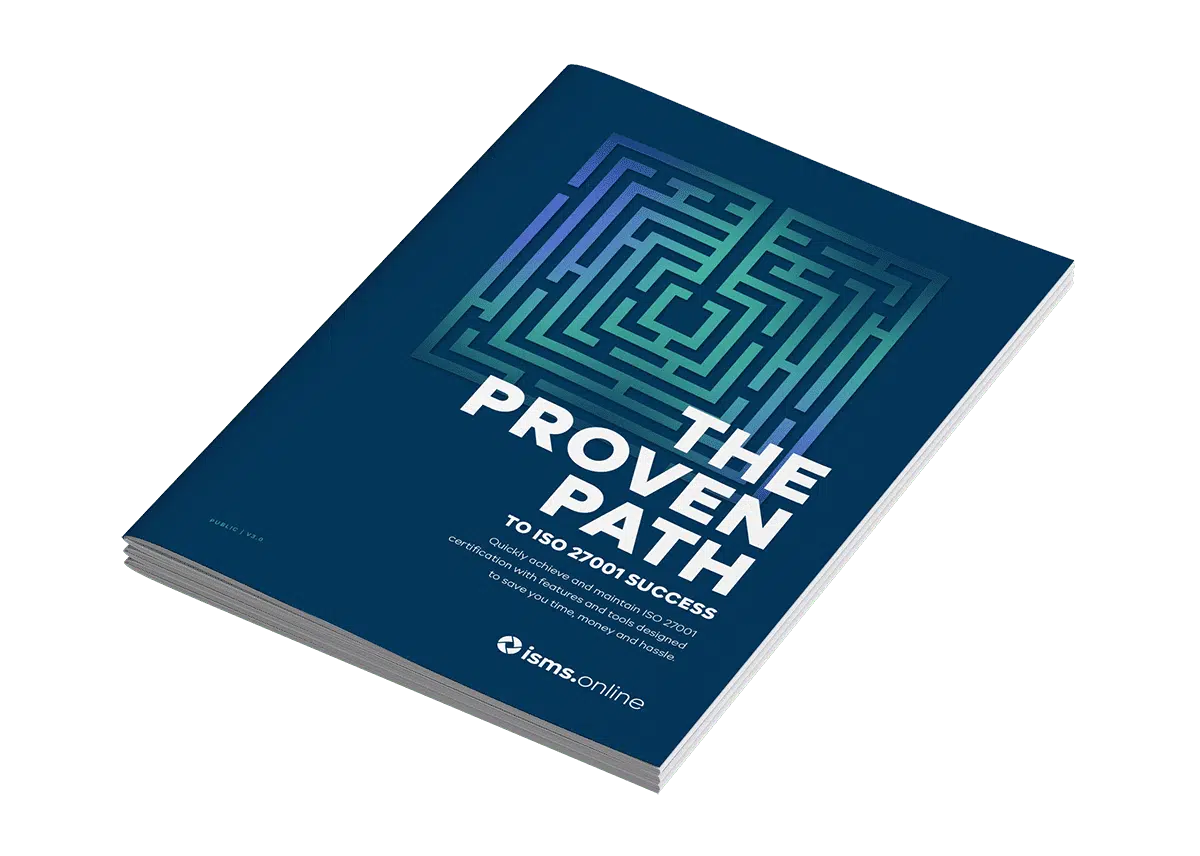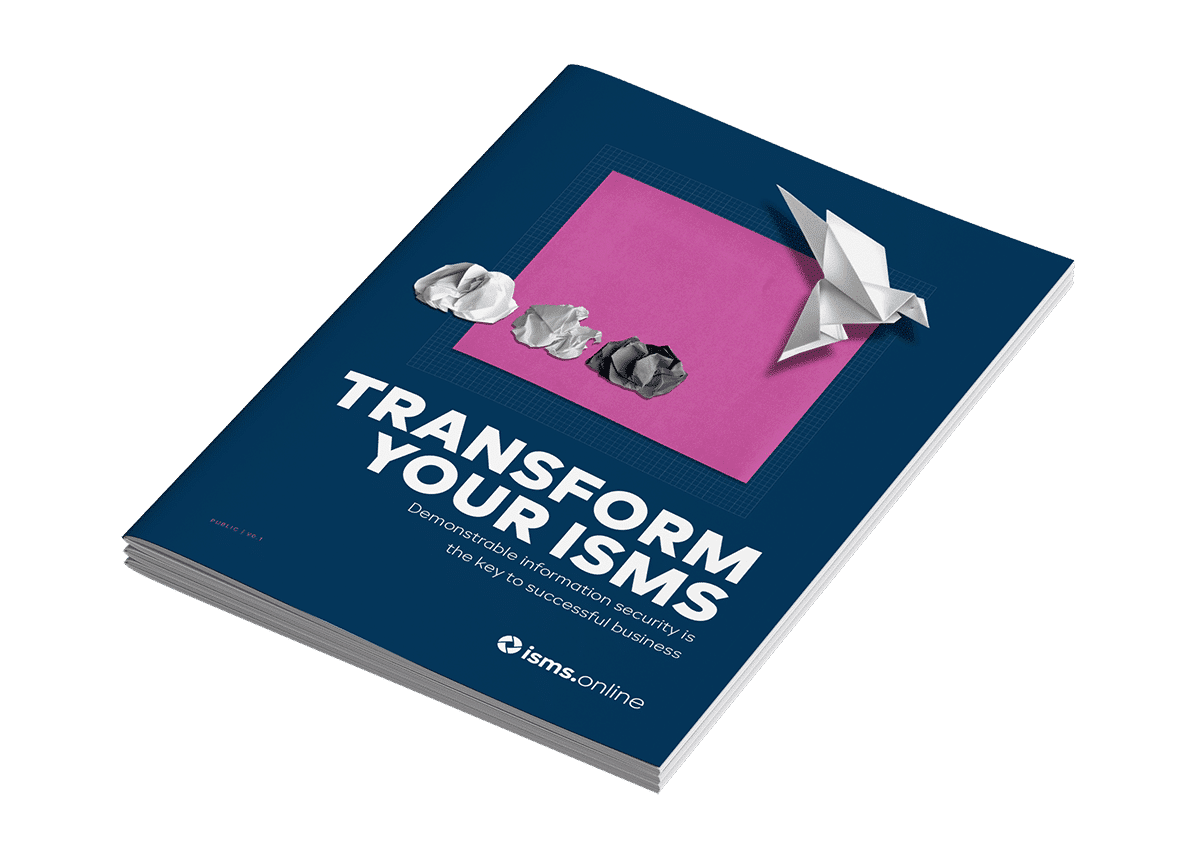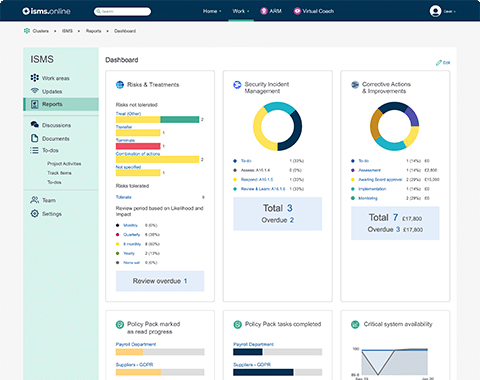Do you need help with ISO 27001? Chat to one of our team today.

As with any new undertaking or project, it is crucial to understand who will need to be involved in ISO 27001. This so that the right levels of resourcing in terms of competence and capacity can be determined and identified.
As ISO 27001 is intended to be a business management system standard, it requires the involvement of senior management, management across the organisation, and subject matter expertise from key areas of the organisation.
Traditionally an organisation may need to bring in an ISO 27001 specialist consultant or send a staff member on a lead implementer course to fill the initial competence gap. ISMS.online can help to fill this competence gap without the need for expensive consultants or training.
ISO/IEC 27001:2013 – to give the current international version its full reference – commonly referred to as ISO 27001, is the internationally recognised standard specification for an Information Security Management System (ISMS).
ISO 27001 is part of a family of standards in the ISO 27k range, covering a wide range of information and cybersecurity topics and compliance guidance.
The ISO 27k family is itself part of a broader family of management system standards based on the ISO/IEC Directives Part 1 (11th Edition 2020) Annex SL, which defines a common Management System framework.
It’s designed to enable a risk-focused business management system supporting the protection of information assets in any form – e.g. within IT systems, on hard-copy or digital media, and even within people’s heads. It’s not intended to be used as a technical security standard.
The standard contains:
Find out more about the core requirements of the ISO 27001 and the Annex A controls you may choose to implement here.
All organisations create, manage, and distribute information, and all information has a value. Implementing an internationally recognised information security management system will help protect the value and give significant business benefit and return on investment.
Such benefits might include:

A tailored hands-on session based on your needs and goals
Whilst ISO 27001 doesn’t specify required roles; several fundamental responsibilities will need to be assigned to ensure that the ISMS aligns with your organisation’s culture and nature and its business operations and successfully manages information risks to a tolerable level.
The term “stakeholders” means different things to different people, and often you will hear about primary, secondary, and even tertiary stakeholders, direct and indirect stakeholders. The ISO management systems standards do not talk about stakeholders, but rather “interested parties”, but this doesn’t mean that you won’t have internal stakeholders for the ISMS.
As ISO 27001 is a business management system standard first and foremost, your primary stakeholders must sit at the most senior management level – this is about protecting your business after all!
You, primary stakeholders, are likely to include:
Secondary stakeholders will be those who will be responsible for some part of the ISMS. This will include subject matter representatives from across the organisation and possibly its partners and even suppliers.
The list of secondary stakeholders will be determined by the size and nature of your organisation, but might include:
The “Lead Implementer” role is the individual responsible for overseeing the ISMS implementation and as such needs to be someone with the knowledge and competence required for the task.
They will need to understand the ISO 27001 standard and associated guidance standards from the same family. They will also need to know the key processes for implementing, operating, monitoring, and improving the ISMS to ensure the ISMS is efficient and effective.
Traditionally, this is either “bought-in” in the form of a specialist consultant or “bred-in” by sending one or more existing staff members on an ISO 27001 lead implementer training course. Both of these usually are expensive options.
The ISMS.online platform provides several tools that help fill the knowledge and competence gap that help reduce or eliminate the need for such expense. These include:
Find out how our more about how ISMS.onlines simplified, secure and sustainable platform can fit for your needs here.
We felt like we had
the best of both worlds. We were
able to use our
existing processes,
& the Adopt, Adapt
content gave us new
depth to our ISMS.
“Everything starts at the top” – ISO 27001 is first and foremost a business management system designed to manage the protection of an organisations information assets and reduce information risks to a tolerable level.
Without support from top level management, it is unlikely that the implementation and operation of the ISMS will be successful, efficient, or effective.
ISO 27001 defines some fundamental clauses that are the responsibility of senior management, including:
Fundamental to the successful implementation and operation of the ISMS will be the information security and governance staff tasked with the ISMS’s overall management and its components.
These are usually staff whose primary role is focused on information security and governance. However, if your organisation is small, this is likely to be one person who has another day job as well.
The ISMS.online platform can help provide the knowledge, competence, and confidence where expert level resources are not available and ensure that the ISMS does not become a burdensome overhead.
As much information is stored, processed, and transmitted on or through IT systems, networks and applications, there will be a need to ensure that appropriate interaction with IT departments and/or suppliers are built into the ISMS at an early stage.
Many of the controls that will be implemented to protect your information assets will be technical controls designed, developed, implemented, and operated by your IT department or suppliers.
Managing the expectations and division of responsibilities for the technical aspects of information and cybersecurity will be critical to the ISMS’s success.
ISO 27001, as with all of the ISO management system standards, requires an organisation to have a programme of internal audits to verify the effective operation of the ISMS and its ability to reduce information risks to a tolerable level.
At a minimum, the ISMS management clauses (4-10) must be audited annually, and Annex A controls audited within the certification period (3 years for UKAS accredited certifications).
The selection of internal auditors must ensure objectivity – that is you can’t audit your own work – and competence – the auditor must have the knowledge and competence to conduct the audit.
Our Virtual Coach service comes prebuilt with everything you need to know about internal audits or read our simplified guide to ISO 27001:2013 Internal Audits with guidance and ideas on how you can achieve your goal.
The Data Protection Officer is typically responsible for ensuring the appropriate management, use, and protection of personally identifiable information (PII) within the organisation. Such information will relate to an organisation’s staff, and often to that of its customers.
This responsibility clearly includes ensuring that adequate information and cybersecurity controls and processes are in place to protect this type of information.
The Data Protection Officer role is not specified or mandated within ISO 27001, however, other relevant legislation and regulation such as the UK Data Protection Act (2018) and the General Data Protection Regulation (GDPR) do require a role of this nature. Additionally, compliance and other controls within ISO 27001 strongly imply the need for such a role.

Download your free guide to fast and sustainable certification

We just need a few details so that we can email you your guide to achieving ISO 27001 first-time
Download your free guide now and if you have any questions at all then Book a Demo or Contact Us. We’ll be happy to help.
If you are looking to achieve recognised and respected certification for your ISMS – necessary to gain the maximum benefit from it – you will need to engage an ISO 27001 accredited certification body to carry out the required audits for certification.
The certification bodies provide auditors with the skills, knowledge, and competence to conduct the certification audits and ensure that certifications are accredited to a consistent level.
Such organisations are usually listed on the website of the territorial accreditation body. In the UK, the accreditation body is the United Kingdom Accreditation Service (UKAS), and they oversee the accredited certification bodies within the UK.
As with any significant project, the time taken will depend upon what needs to be done and the capacity and competence of the resources made available to do it.
For ISO 27001, the “what needs to be done” is well-defined within the standard, and the resources made available will be determined by your organisation.
Typically, for a small to medium-sized organisation with some pre-existing policies and controls, building an ISMS can take anywhere from 6 months to a year (dependant on resource levels). Sometimes, it is even longer if available resources are having to split their time across other jobs. A 150-day (full-time equivalent) project is quite common.
The ISMS.online platform can help significantly reduce your resource levels. Depending on how much of the actionable content you can adopt or easily adapt, the building of your ISMS can be reduced by as much as 75% or 80%. Some customers can go from a standing start to being ready to begin the certification audit process within 6 weeks.
Once your ISMS is built, the certification audit process occurs in two stages with an elapsed timeframe of 2 months being commonplace. Typically the two-stage process is:
Many factors will influence your choice of certification body.
The most important of these will be ensuring that the certification body is accredited. It is possible to gain non-accredited certification. However, this will have limited integrity and value. We strongly recommend that you do not go down this route.
If you already hold other certifications, such as:
You will probably approach your existing certification body first to see if they are also accredited for ISO 27001.
*note – if you already have certifications to other management system standards, you may benefit from integrating these into a single “Integrated Management System” – and the ISMS.online platform can help achieve this.

Download your free guide
to streamlining your Infosec
We have identified above several roles that will be involved in implementing your ISMS, but essentially you will need:
It is an essential part of your ISMS implementation planning that you consider the competence, capacity, confidence, and discipline requirements of your resources if you wish to achieve successful, efficient, and effective implementation in a reasonable timeframe.
A certified ISMS is a continuing journey, not a destination. As such, it will require a certain resource level to maintain it. The more an ISMS is integrated into the organisation’s day-to-day processes, and the more federated the responsibility is, the less overhead it will be.
Beyond the integrated control aspects of the ISMS, you will need to ensure that the critical processes of the ISMS are operated:
This will depend on the nature of the update. All ISO management system standards are viewed and updated periodically.
If the standard is found to be largely appropriate, then it may be that only minor updates are made to the wording.
However, sometimes the standard is re-worked for some reason. This results in a major update that may require a “transition” audit from one version of the standard to the new one.
The last time a major restructure of ISO 27001 occurred was in 2013 (the change from the 2005 version to the 2013 version). As this was a major overhaul, there was a 2-year transition period granted to organisations.
Because such a change can create large amounts of work and cost for many organisations, ISO tries to avoid such significant changes wherever possible.
Whatever the updates are, your certification body should let you know what you need to do.
Rest assured, we will update the ISMS.online platform to reflect the standard’s current version whenever this happens.
Depending on how significant the changes are, you may require an extraordinary audit by the certification body to ensure that your certification covers the new products and services within the ISMS scope.
However, it is common that the certification body will combine this audit with a periodic surveillance audit or at your next recertification audit.
It is important to note that your new products or services may not be covered by your existing certification until confirmation from the certification body has been given.
As with changes to products/services above, you will likely require some level of additional audit from your certification body to verify that your operations in the new country are covered within the scope of the certification.
One crucial factor to consider for extending your ISO 27001 to include operations in new countries is that there will almost certainly be different information security legislation and regulation to consider.
There is no right or wrong answer to this question, and it will be entirely dependent on the structure of your organisation and its culture. However, there are some key points to consider:
One good way that can work for many organisations is for the ownership to be at the organisation’s top level. The ISMS operation can be federated across the organisation but coordinated by a lead resource, such as a CISO or information security manager.
By de-mystifying ISO 27001 and the approach to implementing an ISMS, the ISMS.online platform can accelerate your implementation by focusing your efforts in the right place at the right time.
Additionally, by providing an all-in-one-place ISMS solution, considerable time can be saved by not having to search around for multiple tools, set up complex documentation repositories, and implement new processes – these are all right then in the box from day 1.
The ISMS.online platform can help to significantly reduce to the time required to implement an ISMS by providing you with everything you need to achieve ISO 27001 certification first time.

Book a tailored hands-on session based on your needs and goals.
The ISMS.online platform de-mystifies ISO 27001 and implements and operates an ISO 27001 compliant and certified ISMS. With these and contextualised information in the right place, the ISMS.online platform will help you to easily adopt, adapt, or add to our sample content, and make your journey to certification much easier.
We started off using spreadsheets and it was a nightmare. With the ISMS.online solution, all the hard work was made easy.

Easily collaborate, create and show you are on top of your documentation at all times
Find out more
Effortlessly address threats & opportunities and dynamically report on performance
Find out more
Make better decisions and show you are in control with dashboards, KPIs and related reporting
Find out more
Make light work of corrective actions, improvements, audits and management reviews
Find out more
Shine a light on critical relationships and elegantly link areas such as assets, risks, controls and suppliers
Find out moreSelect assets from the Asset Bank and create your Asset Inventory with ease
Find out more
Out of the box integrations with your other key business systems to simplify your compliance
Find out more
Neatly add in other areas of compliance affecting your organisation to achieve even more
Find out more
Engage staff, suppliers and others with dynamic end-to-end compliance at all times
Find out more
Manage due diligence, contracts, contacts and relationships over their lifecycle
Find out more
Visually map and manage interested parties to ensure their needs are clearly addressed
Find out more
Strong privacy by design and security controls to match your needs & expectations
Find out more